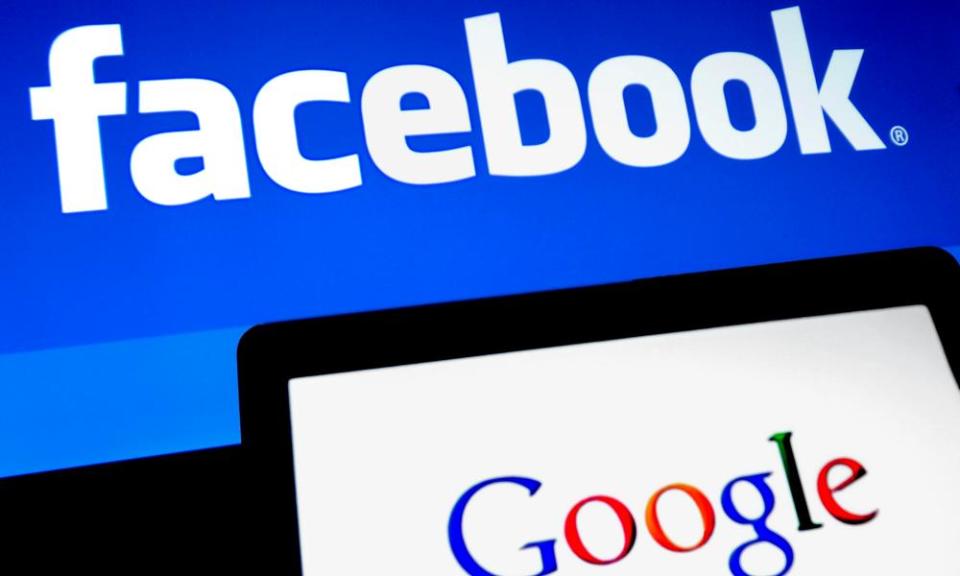Google, Facebook and YouTube found to make up more than 81% of Australian digital advertising

Google, Facebook and YouTube have increased their already substantial share of the digital advertising pie in Australia, leaving less than 20% for news and other websites, according to a new report from the competition regulator.
The Australian Competition and Consumer Commission report was released on Friday as the government puts the final touches on its legislation to force the digital platforms to share revenue with Australian media companies.
The platforms may be forced to pay hundreds of millions of dollars in fines if they fail to comply with the proposed news media bargaining code which was unveiled by the treasurer, Josh Frydenberg, in July.
“The ACCC notes that for a typical $100 spent by advertisers in 2018, $49 went to Google (including ad tech services), $24 to Facebook and $27 to all other websites and ad tech,” the report says.
“This trend has continued in the 2019 calendar year, with $53 to Google, $28 to Facebook and $19 to all other websites and ad tech.”
Related: Backers of Australia's mandatory news code welcome French ruling on Google
While Facebook and Google’s share of advertising has grown, the industry as a whole has been impacted by Covid-19, with spending slowing.
“Facebook advertising expenditure may also be impacted by a number of multinational advertisers which reportedly boycotted advertising on Facebook, but it remains to be seen how these and other events will affect the longer-term advertising revenue of Google and Facebook-owned and operated platforms, and also online advertising services in Australia more broadly,” the report says.
The ACCC found the pandemic and the need for isolation have contributed to the growth of online private messaging and other services including Zoom. The social media platform with the biggest growth has been TikTok.
TikTok has risen in Australia from 500,000 unique users in May 2019 to almost 3.7 million unique users in June 2020.
But along with the increase in online activity has been a growth in privacy concerns. The ACCC says Australians’ online activity is being extensively tracked and it is Facebook and Google who are benefiting from that data.
“The ACCC’s website analysis found Google and Facebook had the largest presence in online tracking, with Google and Facebook’s third-party scripts present on over 80% and 40% respectively of 1000 popular websites in Australia,” the report says. “Amazon and Microsoft tracking were present on nearly 30% and almost 20% of websites respectively.”
Private messaging services have been put under the microscope by the consumer commission.
As of June 2020, Facebook Messenger had an estimated 14.7 million monthly active users and Facebook-owned WhatsApp had an estimated 8 million monthly active users.
Apple’s private messaging system, iMessage, has between 6 million and 12 million daily active users in Australia while Apple’s FaceTime has been used by 33% of online Australian adults in the past six months. Messenger and WhatsApp are funded by advertising and privacy concerns are growing.
“While the content of messages between users is private, the policies of most services confirm that other user information (such as user’s account, device and location information) may be used for targeted advertising,” the report says.
Related: News Corp backs push for ABC and SBS to receive payments from Google and Facebook
The ACCC chairman, Rod Sims, has said the watchdog and the Treasury are working to deliver the revised news media bargaining code to the government later in October.
“We are considering submissions and taking broad feedback into account,” Sims said earlier this month. “The news media bargaining code is designed to encourage good faith, commercial negotiations between news media businesses and platforms. The objective is commercial, not one-sided, outcomes.”
But Google and Facebook remain opposed to the code as it stands.
Google says it wants a code that “works for everyone involved, and most importantly for you and the millions of other Australians who rely on services such as Search and YouTube” and is talking to the government about amendments.
Facebook has warned it will block Australians from sharing news if the landmark plan to make digital platforms pay for news content becomes law.
Google has been running a public campaign against the proposed code and launched an international campaign targeting YouTube users when the government announced it would force the company to pay news publishers for content.

